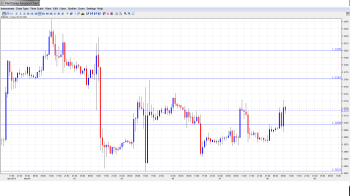So far this week, we haven’t seen any major releases from the Eurozone or the US, and predictably, EUR/USD has responded with little movement. The pair continues to test the 1.31 line in Wednesday’s European session. With what looks to be another quiet day, today’s releases could have added significance. The lone Eurozone release is German Industrial Production. Later on, the US will release Crude Oil Inventories and auction off 10-year bonds.
Here is a quick update on the technical situation, indicators, and market sentiment that moves euro/dollar.
EUR/USD Technical
- Asian session: Euro/dollar crossed above the 1.31 line late in the session and consolidated at 1.3011. The pair is testing 1.31 in the European session.
- Current range: 1.31 to 1.3160.
- Below: 1.31, 1.3030, 1.3000, 1.2960, 1.2880, 1.2805, 1.2750 and 1.27.
- Above: 1.3160, 1.32, 1.3255, 1.3290, 1.3350 and 1.34.
- 1.3160, a critical line, is providing resistance.
- On the downside, the pair is testing 1.3100. 1.3030 is stronger.
Euro continues to trade close to 1.31 – click on the graph to enlarge.
EUR/USD Fundamentals
- 10:00 German Industrial Production. Exp. -0.1%.
- 12:30 FOMC Member Jeremy Stein Speaks.
- 14:30 US Crude Oil Inventories. Exp. 2.1M.
- 17:00 US 10-year Bond Auction.
For more events and lines, see the Euro to dollar forecast
EUR/USD Sentiment
- Draghi open to further cuts: When the ECB cut rates last week to 0.50%, the euro initially move higher, but then dropped after Draghi stated that the ECB would consider negative deposit rates. The reason? Such a move could lead to a flow of funds outside the Eurozone in search of better rates. On Monday, ECB head Mario Draghi stated that ECB was open to lowering rates further, as well as cutting its deposit rates below zero. This time, talk of negative rates did not spook the markets, and the euro remained steady.
- Letta calls for growth, not austerity: New Italian Prime Minister Enrico Letta is on a European tour, and has called for an end to strict austerity. Letta wants to see the Eurozone leaders concentrate on renewing growth, rather than simply implementing more austerity measures. He received an enthusiastic welcome in Paris from French President Francois Hollande, whose popularity has plummeted due to his government’s austerity measures. Letta’s remarks were not received as warmly when he visited Berlin, as Germany is tired of bailing out other zone members and is a strong proponent of fiscal consolidation. We can expect some lively exchanges at future Eurozone summits regarding how to breathe life into the Eurozone’s ailing economy.
- Greece gets good grade from IMF: The IMF released a report this week which commended Greece for its efforts to reduce crippling deficits, noting ”exceptional progress” in the past four years. The IMF also said that Greece had increased competitiveness and kept the financial sector stable. At the same time, the country has failed to tackle tax evasion or cut the bloated public sector, and these factors had contributed to a deep recession. We are no longer hearing whispers of a Greek exit, but the country may still need the helping hands of the IMF and the ECB until the economy shows further improvement.
- Is Spain on the road to recovery? Spanish releases started the week started in fine fashion, as Unemployment Change dropped by 46.1 thousand. This surprised the markets, which had expected a rise of 17.1 thousand. Prime Minister Mariano Rajoy has stated that he expects the unemployment rate, currently at a record 27%, to start dropping in 2014 as the economy improves. Rajoy has implemented tough austerity measures, and further solid numbers out of Spain would be a strong indication that the austerity program is bearing fruit.



Tidak ada komentar:
Posting Komentar